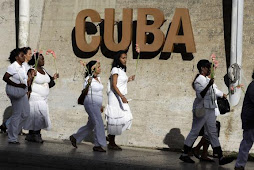American tourists won't bring democracy to Cuba
BY JOSÉ AZEL
jazel@miami.edu
The proposition seems intuitively reasonable: American tourists will
help bring democracy to Cuba. But, it is also demonstrably false.
The idea that American tourists, innately imbued with democratic values
and norms, will proudly reflect and share those values while traveling
abroad is an authentic premise. Thus, we view American tourists as
ambassadors for democracy, and a powerful force in communicating the
virtues of democratic governance. Though this indeed may be the case, it
does not follow with syllogistic certainty that such ambassadorship can
empower of the citizens of a totalitarian regime.
AZEL | C.M.GUERRERO
In the case of Cuba, for decades 2 million tourists from Canada, Europe,
Latin America and elsewhere have traveled yearly to the island with no
impact whatsoever on the Cuban regime. The more empirically valid
argument is that expenditures by tourists add to the longevity of the
regime, since the monies flow into enterprises controlled by the Cuban
military. Moreover, tourist dollars allow the regime to avoid meaningful
economic and political reforms.
In any case, international tourism has not brought about political
reforms in Cuba, or in the remaining universe of totalitarian regimes.
For example, China and Vietnam welcome 130 million and 8 million
tourists respectively each year with no impact on their form of government.
Advocates of tourism as a means to democratic governance counter-argue
that Cuba is different and suggest that it's not the total number of
visitors that counts, but American tourism. Yet, the logic behind this
chauvinistic view of Americans as the only effective couriers of
democratic values is never explained. It is only offered that American
tourists, by some vague cultural and historic affinity, are better
endowed to convey the values of democratic governance to the Cuban people.
But if such cultural and historical kinship does exist, it applies much
more to Spanish-speaking tourists from Latin America and Spain. In fact,
American tourists have only limited contact with the Cuban population.
Most tourist resorts are in isolated areas, controlled by the security
apparatus and off limits to the average Cuban. Most Americans encounter
a language barrier, and it is not clear that they consider their
vacation time as an opportunity to subvert the Cuban regime.
Most likely, Americans, as with most tourists, prefer to relax with
mojitos in the beautiful beaches of Cuba. In the case of cruise-ship
tourism, passengers will disembark for a few hours to purchase rum and
cigars, then return to the ship. Again, it is not clear how this helps
to usher in democratic governance, unless the argument relies on some
mysterious osmotic process.
Nonetheless, rather than rejecting the "American tourists" arguments
only on its lack of logical merits, I looked for statistical proxies to
test the hypothesis.
American tourists represent only 1.6 percent of inbound tourism in
China. In Cuba, tourists from the United States account for 3.3 percent
of total tourism. In other words, Cuba's tourism is twice as "American
intensive" as China's. Neither country has engaged in political reforms,
but it is only fair to ask: What percentage of tourists must be American
in order to validate the "American tourists will bring democracy"
thesis? Answer: unknown.
Another revealing comparison is to relate the number of American
tourists to the population of the host countries. China, with a
population of 1.3 billion, receives 2 million American tourists each
year. Cuba, with a population of 11.2 million, welcomes 90,000
Americans. Thus, on a per-capita basis, Cuba welcomes an American
visitor for every 124 Cubans, while China receives an American tourist
for every 650 Chinese citizens. In theory, at least, this means that the
per-capita concentration of American tourists in Cuba is five times
greater than that of Americans in China, and yet no democratic reforms
are visible in either country.
The point of all this is simply to show that the proposition that
democracy in Cuba relies on American tourists, a tenet of the Obama
administration's new U.S.-Cuba policy, fails to pass the most basic
tests of logical coherence. We deserve more critical and rigorous
thinking from our policymakers.
JOSÉ AZEL IS A SENIOR SCHOLAR AT THE INSTITUTE FOR CUBAN AND
CUBAN-AMERICAN STUDIES, UNIVERSITY OF MIAMI AND THE AUTHOR OF THE BOOK
"MAÑANA IN CUBA."
Source: American tourists won't bring democracy to Cuba | Miami Herald
Miami Herald - http://www.miamiherald.com/opinion/op-ed/article23230851.html
Subscribe to:
Post Comments (Atom)





No comments:
Post a Comment